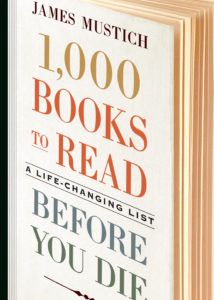
Putting Together the Endless Puzzle
For the past few weeks, one particular book has consumed me. I pore over its pages like some people do a newspaper’s sports or business section. I pay attention to every footnote. I’m inspired by it to head to my local library and spend far too much time perusing. And, funny enough, this book that has obsessed me has, in fact, stalled my reading.
I’m talking about James Mustich’s 1,000 Books to Read Before You Die, a mammoth reference book offering 1,000 literary recommendations along with Mustich’s thoughts on each work. On top of that, each selection comes with its own few “you might also like this” titles. For example, Michael Crichton’s The Andromeda Strain makes the cut, but Mustich also encourages readers to try Outbreak by Robin Cooke and The Hot Zone by Richard Preston. All in all, this may well double Mustich’s total list of recommended books.
So, how many have I read? A paltry 51, just a hair above 5 percent. I’ve been reading on a regular basis since I was about 11, so this puts me on pace to read 204 more books from the list by the time I croak. Not exactly heartening.
Lists like Mustich’s nag at my mind every time I set out to read a new book. Time, The Guardian, Modern Library, and National Review each have published top 100 lists of the best nonfiction books. Time, The Guardian, and Modern Library also have each chosen their picks for the 100 greatest novels. There’s Le Monde’s 100 Books of the Century, the Bokklubben World Library, Entertainment Weekly’s 100 Best Books of All Time, Anthony Burgess’s 99 Best English-Language Novels, Boston Public Library’s 100 Most Influential Books of the 20th Century, Harold Bloom’s The Western Canon, Larry McCaffery’s The 20th Century’s Greatest Hits: 100 English-Language Books of Fiction, along with countless other genre-specific lists, many by Book Riot, of the best works of science fiction, horror, journalism, memoir, essay collection, and so on.
And, of course, there are all the books that appear on none of the above lists but still look interesting.
Oh, and all the books that will be published throughout the rest of my lifetime.
There’s a lot out there to read, and even when I’m on a roll, knocking out one or even two books a week, it eats at me that I’ll never read everything. Scrolling through my to-read list on Goodreads or scanning across the unread books on my shelf is akin to staring up at a mountain I can’t see the top of, or running toward an invisible—or nonexistent—finish line.
This is not a fun way to read. Sure, lists are an excellent way to turn yourself on to new authors and books, but they also can turn reading into an assembly line task, books into boxes to check off. They can indeed make reading boring.
You can read for whatever reason. For me, literature is a road to personal enrichment. Reading, along with listening to music, watching movies and traveling, is about putting together a puzzle you know you’ll never finish. That’s the point, that there is no completed picture, no finish line, no top of the mountain.
I may eventually become familiar with every genre but never fully commit to one. One day, science fiction or fantasy may suck me in and I’ll never look back. I may continue burning through memoirs, which have captivated me since high school. It’s unlikely, but I may even read every single novel, essay, poem, piece, play, and story I’ve ever wanted to. But I will never be done.


















